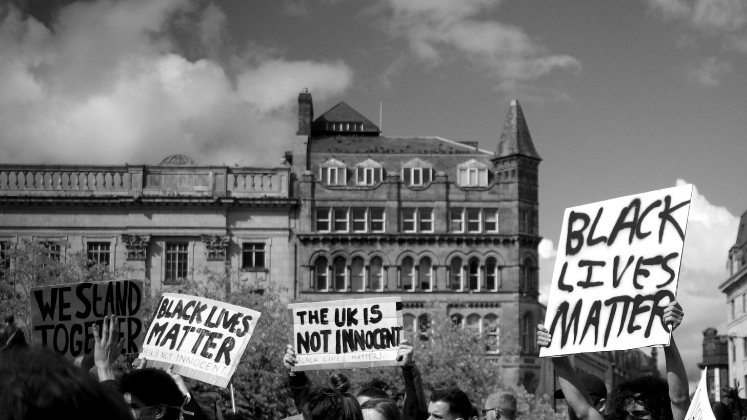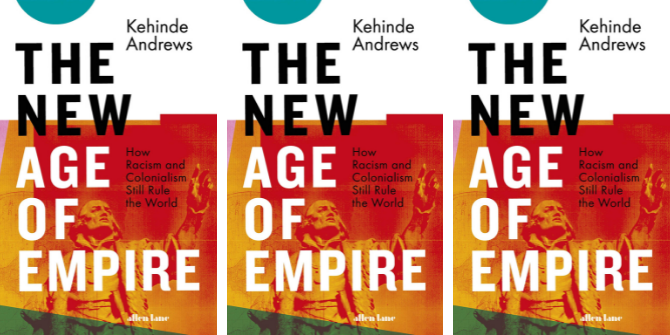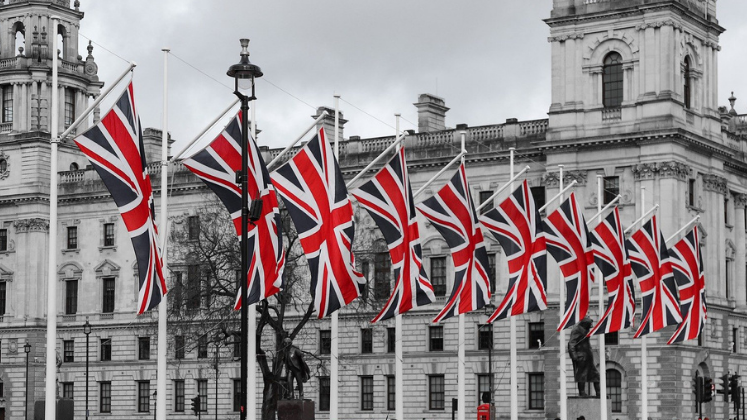In Empire’s Endgame: Racism and the British State, Gargi Bhattacharyya, Adam Elliott-Cooper, Sita Balani, Kerem Nişancıoğlu, Kojo Koram, Dalia Gebrial, Nadine El-Enany and Luke de Noronha explore how shifting ideas of race and nation have legitimated the expansion of punitive state powers and practices in the UK, resulting in the heightened control, punishment and stigmatisation of racialised minorities. This is a valuable commentary on racism in contemporary Britain that encourages readers to be agile and novel in making connections between the past and present, between now and yesterday, to confront the problems of today, writes Rémy-Paulin Twahirwa.
Empire’s Endgame: Racism and the British State. Gargi Bhattacharyya, Adam Elliott-Cooper, Sita Balani, Kerem Nişancıoğlu, Kojo Koram, Dalia Gebrial, Nadine El-Enany and Luke de Noronha. Pluto Press. 2021.
 On 11 July 2021, a few hours after England’s defeat by Italy in the final of the Euro 2020 football tournament, a mural with footballer Marcus Rashford’s portrait was defaced in Manchester. Although Manchester Police’s statement specified that the graffiti was ‘not believed to be of a racial nature’, the three black football players who missed their penalty kicks (Rashford, Jadon Sancho and Bukayo Saka) were victims of online harassment, including racist and xenophobic attacks, as soon as the game ended.
On 11 July 2021, a few hours after England’s defeat by Italy in the final of the Euro 2020 football tournament, a mural with footballer Marcus Rashford’s portrait was defaced in Manchester. Although Manchester Police’s statement specified that the graffiti was ‘not believed to be of a racial nature’, the three black football players who missed their penalty kicks (Rashford, Jadon Sancho and Bukayo Saka) were victims of online harassment, including racist and xenophobic attacks, as soon as the game ended.
Politicians, spokespersons and experts from the football community and many celebrities were quick to condemn the spread of the racist campaign targeting Rashford, Sancho and Saka. From Prime Minister Boris Johnson to Prince William to the Football Association (FA) and even the much-criticised Home Secretary Priti Patel (who weeks before the Euro final described ‘taking the knee’ as ‘gesture politics’), many considered, in the words of the England team’s manager, Gareth Southgate, that racist abuse was ‘not what we stand for’. Then, if this is not England (the team as much as the country), if this is not what we stand for as people and as a nation, how to explain the rapid propagation of racist comments online as Twitter was officially reported to have deleted 1,000 tweets in less than 24 hours?
We’ve issued a statement after a number of @England players were subjected to racist abuse online following the #EURO2020 final: https://t.co/B7gB180OQa
— The FA (@FA) July 12, 2021
For the establishment, as exemplified by the FA’s tweet above, the answer was to condemn social media companies for falling to control the dissemination of racist content on their platforms. Whilst acknowledging that it may raise some questions about rights to free speech, this particular focus on Twitter’s response to online hate has even led some scholars to suggest that the social networking site should develop some kind of monitoring tool that will pre-emptively discard racist content in the future.
However, for the authors of Empire’s Endgame: Racism and the British State (the title a reference to the Cultural Studies classic, The Empire Strikes Back, and Marvel’s Avengers: Endgame), the answer to the roots of this surge of online hate may be hidden in plain sight – the British state itself. Practices and representations of state neglect, cruelty and racialised expulsion, in addition to serving to ‘make racists’ (4), are also ‘produc[ing] political subjects who long for authority, closure and certainty in ways which exceed the racial and implicate all of us’ (4). In our digital world, online platforms such as Twitter, Facebook and Instagram have come to mediate these desires and frustrations ‘of [post] racial imperial anxieties’ (3-4). In sum, what happened after England’s defeat may not be what the Three Lions, or Twitter, or the ‘nation’, or the ‘people’ stand for, but if we agree with Empire’s Endgame’s main thesis, it may tell us what the British state stands for today.
Anarchic Mix of Collective Thinking
Resisting academic norms and practices of individual thinking and ownership that result generally in books separated into a one-chapter-one-writer format, Gargi Bhattacharyya, Adam Elliott-Cooper, Sita Balani, Kerem Nişancıoğlu, Kojo Koram, Dalia Gebrial, Nadine El-Enany and Luke de Noronha opt for ‘an anarchic mix of collective thinking’ (iii) to examine racism in ‘contemporary Britain’ (ix). This collective writing process makes it impossible for the authors (and readers) to know who wrote what.
Bhattacharyya et al refuse ‘class reductionism’ (3) and instead view ‘racism as historically specific and messy’ (1). This is why the authors choose to ‘map some of the complex relations between empire, racist culture, state practices and political economy’ (1), with the help of various theoretical frameworks (including black studies, race, ethnicity and postcolonial scholarship, gender studies and immigration studies) and secondary data (academic and non-academic sources, mainly newspapers and academic journals). Through this book, they ‘trace how shifting ideological repertoires of race and nation legitimate new forms of state power and practice in the context of this “organised abandonment”’ (2).
A River of Blood: State Neglect, Cruelty and Expulsion in An Unhappy Place
Divided into five parts with fifteen chapters in total, the book firstly looks at how the British state, politicians and traditional media have created ‘folk devils’ through different moral panics aiming at racialised minorities (including the ‘Windrush scandal’, the ‘knife-crime epidemic’ and Britain’s so-called ‘gang problem’).
What interests the authors is how, for example, the Windrush scandal was not only about ‘aggressive immigration policies’ and ‘racist institutions’ (29) — this part is obvious as it has been largely proven — but rather how the ‘hostile environment’ measures were part of a ‘larger bid to further delegitimise any remaining investment in the caring, welfarist state’ (29).

Image Credit: ‘Home Office Immigration enforcement van’ by Counse licensed under CC BY 2.0
Moreoever, Bhattacharyya et al point to how the scandals of ‘knife crimes’ and ‘gang violence’ in urban centres led to new and different modes of control, criminalisation and expulsion of young black and brown Britons that generate ‘widespread anxieties over national identity, cultural difference and insecurity in ways that prove to be politically useful’ (40).
By racialising these ‘crises’, the authors note that the British state has been enforcing policies that act as a ‘racist collective punishment’ (47) — linked to colonial and imperial Britain. This allows wider moves to ‘expand executive power and circumvent the meagre protections afforded by the independent judiciary, thereby transforming the state and the fundamental practices through which it gets defined’ (53). In other words, it is through the collective punishment and stigmatisation of racialised minorities that the British state is expanding its punitive power and authoritarian nature, and this is the real political aim of such policies.
It is in the second part, ‘The Persistence of Nationalism’, that Bhattacharyya et al discuss how nationalist calls have been put into policies and discourses on both sides of the political spectrum. For the authors, it is important to notice ‘the colonial amnesia, nostalgia and melancholia that fuel Britain’s confused nationalist convulsion’ (14). The most important contribution, in my view, is how the authors shed light on the haunting presence of Enoch Powell’s 1968 ‘Rivers of Blood’ speech in the present-day framing of Britain as a ‘nation under threat’, opposing the ‘migrant’, ‘global/metropolitan elite’ and the ‘decent, ordinary fellow Englishman’ (who is white and a citizen) (63-65).
Powellism is evident in recent nationalist expressions from the right (‘hostile environment’ policies, UKIP, the Leave Campaign, etc). However, Bhattacharyya et al suggest it also manifests in the proposal by some progressive nationalists (liberals and some leftists) to develop, as the Guardian columnist Zoe Williams called it, a ‘good nationalism‘ that would challenge the Tories and the far right’s ‘bad nationalism’.
For the authors, by recasting Britain’s national history through key events such as the abolition of slavery or the making of the NHS, as suggested by Williams, this ‘progressive patriotism’ omits parts of what made this country what it is, meaning colonialism and imperialism. Put simply: ‘Whereas right-wing nationalism practices an imperial nostalgia, progressive nationalism appears to depend on imperial aphasia’ (72).

Image Credit: Photo by Sushil Nash on Unsplash
In addition to the selective nature surrounding what this nation was and is, progressive nationalism also ‘relies on a set of assumptions about the value of differently racialised people; foreigners are placed outside of progressive narratives of a nation supposedly grounded in working-class solidarity’ (73). What this can lead to is a ‘progressive’ project that can be translated as ‘we will exclude immigrants for the sake of workers and equality’ (79). In fact, nationalism, even on the left, seems to be about bordering the nation by dividing people into who is in and who is out (82).
The Daddy-State and the Longing for Authority
I found the third section, ‘State Patriarch’, a little disputable. Chapters Seven, Eight and Nine take a feminist approach to further explore the book’s object of study by metaphorically referring to the British state as a ‘state patriarch’. This metaphorical device is said to help with thinking about racism and nationalism in contemporary Britain through sexuality and gender relations (103-108). For instance, the authors point to how the post-war welfarist state ‘sought to organise populations through the management of gender roles and family units, rewarding some normative behaviours and penalising the deviant through the allocation of welfare’ (106).
Despite the decimation of the welfare state, or because of it, the family metaphor of the nation — still powerful in British politics — seems to now only characterise an ‘angry father’ who is ‘cold and often brutal’ (108). If the father figure is a Janus with caring (welfare state) and punitive (neglectful state) faces, today punishment has become the sole priority and function of the British state (109).
Bhattacharyya et al demonstrate this with one specific case, the state response to ‘Pakistani grooming gangs’ (Chapter Eight). As explained earlier, the authors highlight how the notion of ‘gang’ is racialised in British public spaces and politics. In fact, the multiple news stories about ‘Asian’, ‘Pakistani’ or ‘Muslim’ men sexually exploiting white girls in Rochdale and Rotherham have contributed to increasing state punishment power in order to protect white gender roles and the white family (123).
One fundamental punitive practice that was enacted by the British state was the deprivation of citizenship to racialised Britons (124). In the Rochdale case of Abdul Aziz, Adil Khan and Qari Abdul Rauf, the authors note that the stripping of British citizenship of the three men was the first instance of such practice following serious criminality without a national security component (124). One can also see this in the Shamima Begum case as she symbolises the opposite of Rochdale and Rotherham’s white girls (purity and innocence of the nation) (125) who must be protected. The recent stand of the Home Secretary for the deportation of Jamaican nationals suggest that the banishment of ‘foreign offenders’ (mostly racialised men coming from the Global South) is here to stay.
In the end, however, Bhattacharyya et al’s analysis falls flat, or at least has unresolved tensions. If I agree with the premise of their analysis of how sexuality and gender relations are constructed and reconfigured through racism and nationalism, the framing of the state as this ‘angry father’ did not convince me. It is not clear, for instance, how this daddy-state is represented in the ‘man-child’ (128) political leadership/persona of Boris Johnson (analysed in Chapter Nine). This work also reinforces still present yet archaic tropes about fatherhood/manhood that have been and are questioned by current feminist and queer interventions. The authors emphasise that they reject the naturalisation of the nation state as family (128), while paradoxically integrating the nation-as-family narrative with the concept of ‘state patriarch’. Here, the text is not entirely doing the work it sets out to do: it does not delink itself from patriarchal and heterosexual reasoning.
Finally, the authors examine the militarisation of British society (Part Four) and discuss the current health crisis (Part Five). In Chapter Ten, Bhattacharyya et al reflect on the demand to ‘send in the army’ to deal with the migrants, the criminals, the ‘gangsters’, etc. This longing for authority, note the authors, is reminiscent of the imperial era of the British state (143-44) and is translated into the control, surveillance, caging and expulsion of racialised Britons.
What Needs to be Done?
The last part of Empire’s Endgame concludes the authors’ inquiry with a close look at the COVID-19 pandemic, which exhibited racial inequalities in the working class, and also to recent anti-racist political projects (Black Lives Matter, Grenfell Survivors and the United Families and Friends Campaign). It is with hope that Bhattacharyya et al end their ‘anarchic mix of collective thinking’: hope in an abolitionist future. In fact, abolitionist projects (of prisons, borders, the police, capitalism) are oriented ‘by something like love’ (199). This is why they may guide us in building what will emerge out of the empire’s endgame: love over hate, solidarity over division, bridges over walls and cages, peoples over nations.
In this sense, Empire’s Endgame is a valuable commentary not only on race and racism in contemporary Britain, but also, and more importantly, on the ‘organised abandonment’ of British people by the British state that has been converted by governments, politicians and the media into racial tensions and racialised crises. It is important to note that the intended audience of Empire’s Endgame is mostly readers on the left. In fact, the book is really a call for the left to make connections (between here and there, now and yesterday) and to get rid of the cynical position that ‘[we] have seen it all before’ (4). The authors ask comrades and political allies to be agile and novel in their thinking around problems that seem ‘old’, as ‘one thing that our enemies do well, do better than us, is to retain the element of surprise’ (4).
Note: This review gives the views of the author, and not the position of the LSE Review of Books blog, or of the London School of Economics and Political Science.
Banner Image Credit: Photo by Anita Mihaly on Unsplash.







